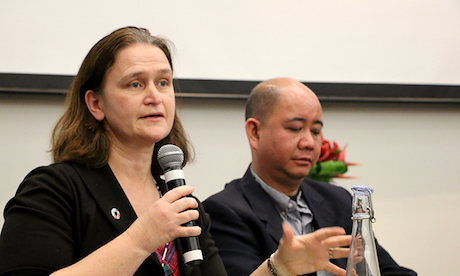It is important to “speak truth to power” and ask where climate finance is going says Julianne Hickey.
Hickey, the director of Caritas Aotearoa New Zealand, was speaking at the annual conference of the Australasian Catholic Press Association (ACPA) last month.
“In the beginning, none of the climate finance was reaching the Pacific, let alone the vulnerable on the margins and those most impacted,” Hickey said.
“What we’re now seeing is the core of the climate finance is flowing, but we need to make sure we keep asking the questions,” she said.
Asked to expand on this when talking separately to Asia Pacific Report, Hickey explained climate finance in the region is geared towards large projects which may not be reaching the most vulnerable.
“There’s a lot of money available for climate change. For mitigation and adaptation, our biggest concern is that it’s about reaching those on the ocean edges and at the grassroots.”
“It’s about reaching the poor and the vulnerable,” she said.
Hickey said engaging with the Pacific and its stories of climate change is key to tackling the global issue.
“It’s about listening, it’s about the margins and the peripheries,”
In some places it’s floods, in some places it’s fire, in some places it’s losing your home, in some places it’s about food and water.
New Zealand plays a role in funding mitigation and adaptation projects in the region.
The Ministry of Foreign Affairs and Trade (MFAT) says it is serious about addressing climate change in New Zealand and in the Pacific.
At COP21, $NZ200 million was pledged in climate related support over four years and the government has contributed three million dollars to the UNFCCC’s Green Climate Fund.
One of MFAT’s focuses is switching Small Island Developing States (SIDS) to a low-carbon economy.
However, New Zealand has been criticised for the lack of its own clean energy revolution and commitment to the Paris Agreement.
Source
